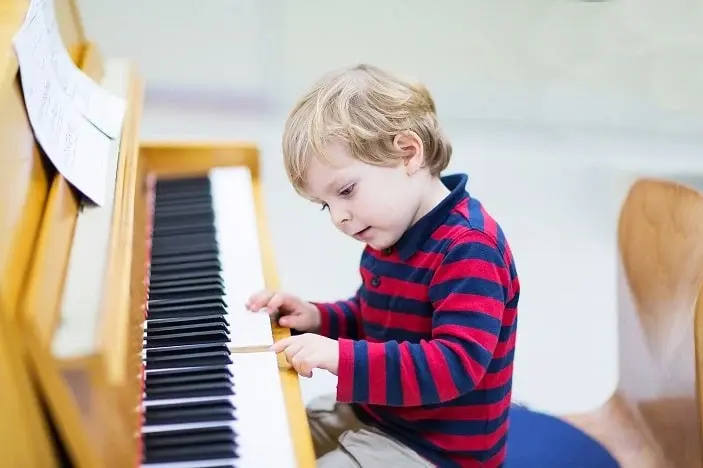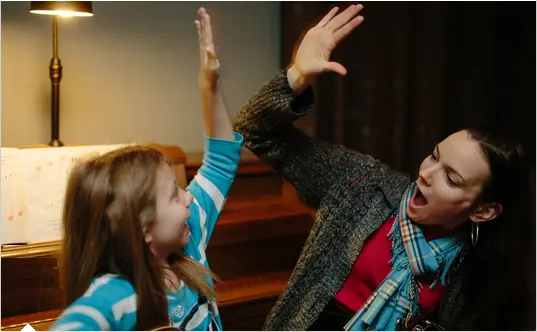The Surprising Benefits of Piano Lessons for Child Development
- tschilbclick
- Mar 28, 2023
- 4 min read
As a piano teacher for several years, I've had the pleasure of watching many of my young students flourish under the power of music!
Although most parents enroll their children in piano lessons for the simple joy of learning an instrument, few realize the wide-ranging benefits these lessons can have on their child's development.
From cognitive and emotional growth to social skills and beyond, piano lessons offer a world of possibilities for children, particularly from ages 5 to 15.

Cognitive Benefits: Unleashing Your Child's Intellectual Potential
1. Improved Brain Function
Stronger neural connections
Enhanced spatial-temporal skills, memory, and attention (Rauscher, Shaw, & Ky, 1993)
Learning to play the piano can make your child's brain work more efficiently
The power of music to improve your child's brain function is truly remarkable. As a piano teacher, I have witnessed countless instances of students becoming more focused and alert over time.
The process of learning to play the piano helps develop stronger neural connections, allowing information to flow more smoothly between different regions of the brain. This increased connectivity has been linked to enhanced spatial-temporal skills, memory, and attention, as shown in a study by Rauscher, Shaw, and Ky (1993).
Spatial-temporal skills are critical for problem-solving and abstract thinking, while improved memory and attention can enhance a child's ability to retain and process information effectively. By learning to play the piano, your child's brain becomes a finely-tuned instrument, ready to tackle the challenges of their intellectual journey.

2. Enhanced Academic Performance
Higher scores on standardized tests
Stronger mathematical, reading, and language skills (Costa-Giomi, 2004)
Increased focus and discipline in academic pursuits
In addition to the cognitive benefits, piano lessons can also lead to better academic performance. As a result of the enhanced brain function mentioned earlier, children who take piano lessons often see improvements in their math, reading, and language abilities. A study by Costa-Giomi (2004) found that children who received three years of piano instruction performed significantly better on standardized tests than their peers.
The discipline, focus, and patience required to master a musical instrument can be directly translated to academic pursuits. Students who learn to concentrate on practicing the piano are better equipped to devote their attention to their studies, leading to increased success in the classroom.

Emotional Benefits: Fostering Emotional Growth and Expression
1. Boosted Self-Esteem
Overcoming challenges leads to a sense of accomplishment
Greater confidence in other areas of life
As children overcome the challenges inherent in learning to play the piano, they experience a sense of accomplishment that bolsters their self-esteem. They learn that they are capable of achieving their goals with perseverance and hard work, fostering a healthy sense of self-worth that extends far beyond the keyboard.

2. Emotional Expression
Valuable outlet for emotional expression
Deeper understanding of emotions
Better management of feelings and resilience

Piano lessons provide children with a valuable outlet for emotional expression, helping them develop a deeper understanding of their own feelings and those of others. By learning to convey their feelings through music, children, including many of my students, develop emotional maturity that helps them navigate life's ups and downs with resilience and grace.
By exploring the cognitive, emotional, and social benefits of piano lessons, it's clear that learning to play the piano has a profound impact on a child's development. As they grow and evolve as musicians, they also grow and evolve as individuals, unlocking their full potential in every aspect of their lives.
So, whether your child aspires to be a professional musician or simply enjoys making music for personal pleasure, the piano offers a solid foundation for a lifetime of learning, growth, and self-discovery. Busting Common Misconceptions and Challenges
1. "My child isn't talented enough."
Practice and perseverance are more important than innate ability when it comes to mastering an instrument (Ericsson, Krampe, & Tesch-Römer, 1993). With dedication and the right guidance, any child can learn to play the piano and reap its many benefits.
2. "Piano lessons are too expensive."
While piano lessons can be an investment, the benefits they offer make them well worth the cost. Your child's future is worth it!

Inspiration from Famous Musicians Who Started with Piano Lessons

Many famous musicians got their start with piano lessons, demonstrating the instrument's potential to serve as a foundation for a successful career in music.
For example, the legendary Beatles songwriter Paul McCartney began learning piano at a young age, which helped him develop his unique composing style.
Similarly, celebrated singer-songwriter Alicia Keys started taking piano lessons at the age of seven and has since become a 15-time Grammy Award winner. Her early exposure to classical piano training played a significant role in shaping her signature sound.
Another notable example is the virtuoso cellist Yo-Yo Ma, who initially learned the piano before switching to the cello. This early piano training helped lay the foundation for his extraordinary musicianship and renowned career as a world-class performer.
Conclusion: The Transformative Power of Piano Lessons
Piano lessons offer a multitude of benefits for child development, ranging from improved cognitive function and academic performance to emotional growth and social skills.
By debunking common misconceptions and overcoming challenges, parents can provide their children with an enriching musical experience that lasts a lifetime.
Whether your child aspires to be a professional musician or simply enjoys making music for personal pleasure, the piano offers a solid foundation for unlocking their full potential.
As a piano teacher, I can attest to the transformative power of music in my students' lives, and I encourage you to consider piano lessons as a valuable investment in your child's future.
Ready to get started? Contact me today at Tommy Schilb's Piano Lessons to schedule a trial lesson and witness the incredible benefits of piano lessons firsthand.

References: Costa-Giomi, E. (2004). Effects of three years of piano instruction on children's academic achievement, school performance, and self-esteem. Psychology of Music, 32(2), 139-152. Ericsson, K. A., Krampe, R. T., & Tesch-Römer, C. (1993). The role of deliberate practice in the acquisition of expert performance. Psychological Review, 100(3), 363-406. Rauscher, F. H., Shaw, G. L., & Ky, K. N. (1993). Music and spatial task performance. Nature, 365(6447), 611.



Comments